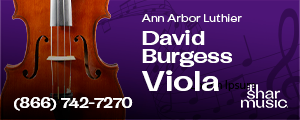Violinist.com Discussion Forum
| Active Threads | Last Update | Responses |
|---|---|---|
Do you lesson plan?| 9:51 PM | 9 | |
Excellent interview| 6:45 PM | 12 | |
Ithica College Summer Music Experience?| 5:46 PM | 4 | |
Hindemith Violin Concerto | 4:20 PM | 21 | |
Henle digital editions| 1:47 AM | 4 | |
MUSIC AND THE ANXIETY OF INFLUENCE | Dec 11, 2025 | 4 | |
On the selection of wood and bamboo for musical instruments | Dec 11, 2025 | 12 | |
Helpful string identification chart| Dec 11, 2025 | 5 | |
Not a perfect bow for not a perfect violinist | Dec 10, 2025 | 18 | |
"What is the difference between a violin and a fiddle?" I need fresh answers!| Dec 9, 2025 | 75 | |
| Parting ways Life in general | Nov 21, 2025 | 13 |
| Violin with wolf tone for student Instruments | Nov 20, 2025 | 45 |
| Bridge angle Instruments | Nov 19, 2025 | 9 |
| How do you take care of your violin in winter? Trunk or in the car? Instruments | Nov 19, 2025 | 24 |
| Music score, Ronald Binge. Repertoire | Nov 18, 2025 | 4 |
| Leatherwood concerto Accessories | Nov 18, 2025 | 21 |
| EP Neo strings durability? Instruments | Nov 17, 2025 | 21 |
| More Archived Threads |
|---|
| Most recent threads, plus threads from 2017, 2016, 2015, 2014, 2013, 2012, 2011, 2010, 2009, 2008, 2007, 2006, 2005, 2004 |
Violinist.com is made possible by...
International Violin Competition of Indianapolis
Violinist.com Holiday Gift Guide
Dimitri Musafia, Master Maker of Violin and Viola Cases
Johnson String Instrument/Carriage House Violins
Subscribe
Laurie's Books
Discover the best of Violinist.com in these collections of editor Laurie Niles' exclusive interviews.

Violinist.com Interviews Volume 1, with introduction by Hilary Hahn

Violinist.com Interviews Volume 2, with introduction by Rachel Barton Pine






